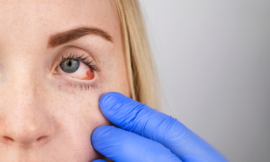Posted by:
Eyes on Rosemont
in Conditions That Affect Vision
What You Need to Know About Uveitis Uveitis, a painful eye condition that affects the middle of the eye, can lead to vision loss if it’s not treated in a timely manner. Fortunately, your optometrist can offer several treatments that will help reduce pain and preserve your vision. Uveitis Causes Inflammation in the Eye Uveitis […]
Read
More
Posted by:
Eyes on Rosemont
in Conditions That Affect Vision, Newsletters
Macular degeneration represents one of the most significant causes of vision loss in older adults. According to the Centers for Disease Control and Prevention, an estimated 1.8 million people currently suffer from macular degeneration, with an additional 7.3 million people at risk of developing this condition. Understanding the causes of and treatments for macular degeneration […]
Read
More
Posted by:
Eyes on Rosemont
in Conditions That Affect Vision, Newsletters
Amblyopia, also known as lazy eye, is a visual disorder caused by abnormal vision development, often occurring during infancy. Patients with amblyopia have reduced vision in one eye, because it is not working properly in conjunction with the brain. With early detection and proper treatment, loss of vision can be avoided for many children. However, […]
Read
More
Posted by:
Eyes on Rosemont
in Conditions That Affect Vision, Newsletters
Glaucoma is a serious disorder that can damage the optic nerves of your eyes if left untreated. The optic nerve carries images from your eyes to your brain. If the nerve is damaged, full or partial vision loss can occur. In some cases, people develop glaucoma because the pressure in their eyes begins to increase […]
Read
More
Posted by:
Eyes on Rosemont
in Conditions That Affect Vision, Newsletters
For many, the term binocular vision conjures images of super powers or the rare ability to spot objects far away, but having binocular vision simply means having two eyes with which to see. Binocular vision does lend creatures with two eyes advantages over those with only one, such as enhanced vision, depth perception, and a […]
Read
More
Posted by:
Eyes on Rosemont
in Conditions That Affect Vision, Newsletters
Diabetic retinopathy refers to several eye problems that are characterized by damage to the light-sensitive retina, caused by excessive blood sugar levels. Almost half of Americans with diabetes suffer from some level of diabetic retinopathy. When glucose levels in the blood are not properly controlled, it can result in the formation of glaucoma, cataracts or […]
Read
More
Posted by:
Eyes on Rosemont
in Conditions That Affect Vision, Newsletters
Glaucoma is the second leading cause of blindness worldwide, reports the Glaucoma Research Foundation. This common eye condition typically affects older adults, although infants and young adults are also at risk. Fortunately, however, cutting-edge research is improving diagnosis and treatment of this common eye disease. Talk to your optometrist about glaucoma care for the latest […]
Read
More
Posted by:
Eyes on Rosemont
in Conditions That Affect Vision, Newsletters
Strabismus is the medical term for the misalignment of the eyes. Commonly referred to as cross-eyed or wall-eyed, strabismus may involve either one or both eyes turning inward, outward or even up or down. It is one of the most common vision conditions in young children, affecting somewhere between 2 and 4 percent of the […]
Read
More
Posted by:
Eyes on Rosemont
in Conditions That Affect Vision, Newsletters
Astigmatism is an extremely common eye condition that affects both children and adults. It occurs when there is an imperfection in some part of your cornea, the clear tissue that covers your iris. Light rays pass through the cornea as they travel to the retina, a thin layer of cells at the back of your […]
Read
More
Posted by:
Eyes on Rosemont
in Conditions That Affect Vision, Newsletters
If you have never suffered from dry eye, you might not appreciate how important your tears are to your eye health. Without enough moisture, your eyes can become dry, itchy, red and uncomfortable. Dry eye occurs when you do not make enough tears or the tears you produce are not high quality. The Importance of […]
Read
More










